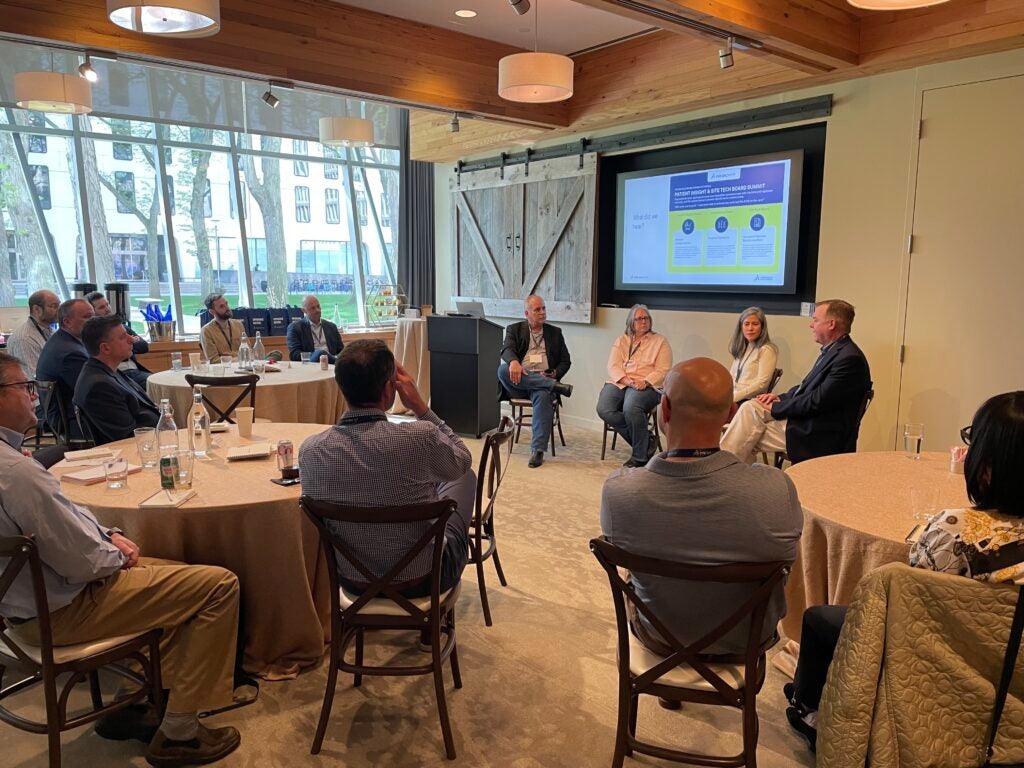Patient Payment Optimization: The Challenges & Opportunities

Flexibility, transparency, empathy, and a sense of shared purpose were key components for success when it comes to patient payments—based on a recent conversation between experts who live it every day: patients, sites, and sponsors.
Earlier this year, Medidata hosted two in-person Patient Payments Workshops where pharma and biotech leaders got to talk one-on-one with patient advocates and site representatives. The goal was to bring together these key stakeholders to share their unique perspectives, and to discuss challenges, opportunities, and how they can work together to revolutionize patient payments and deliver the best patient experience and better outcomes.

Michael Tucker, Medidata’s Vice President of Patient Experience, led a panel discussion that included Alicia Staley, Medidata’s Chief Patient Officer, Christina Ludwick, Director of Research for the Virginia Research Center, and Dave Bjork, Patient Advocate.
Read on for the key takeaways from the workshops:
The Burden of Financial Toxicity and Payment Frustrations
A recurring theme in the discussions was the concept of "financial toxicity" in healthcare, which extends to clinical trials. Patients often bear a significant financial burden—not just from medical care, but also from the direct and indirect costs of trial participation. Dave Bjork, a patient advocate, highlighted the frustration of delayed or batch payments. "If patients are waiting to get paid or reimbursed for some cost that they incurred, that's very frustrating," he stated, emphasizing the disconnect between a patient's immediate financial needs and the often-slow reimbursement cycles. This burden can be exacerbated by the need to meticulously track expenses and act as an "auditor" or "accountant" to ensure timely compensation, a task patients shouldn’t have to undertake.
Christina Ludwick, representing the site perspective, echoed these concerns, noting the challenge of not always knowing the sponsor's payment schedule when using preferred vendors. This lack of transparency makes it difficult for sites to set clear expectations with patients, leading to a breakdown of trust when payments are delayed or issues arise.
Sites often find themselves in the unenviable position of being the "middleman" or "detective," troubleshooting payment issues between patients and sponsors, further diverting their resources from core clinical work.
The inability to resolve payment discrepancies can significantly "degrade the relationship of trust between sites and patients," a crucial element for successful trial participation.
The Imperative for Transparency and Choice
Both patients and sites unequivocally emphasized the need for greater transparency and choice in payment processes. Alicia Staley, Medidata’s Chief Patient Officer, articulated the goal of bringing "a level of efficiency and transparency and trust into this relationship that we typically haven't seen." For patients, this translates to knowing when and how they will be paid, and having visibility into the status of their reimbursements. Dave Bjork's analogy of tracking a package highlights this desire for real-time information: "Being able to find out what the status is at your fingertips is invaluable."
The need for choice extends beyond transparency. Patients come from diverse backgrounds and have varying preferences for receiving payments.
The discussions revealed a strong desire for multiple disbursement options beyond traditional bank transfers or debit cards. The historical reliance on debit cards was highlighted as particularly burdensome, due to issues like storage, fraud risk, difficulty tracking balances, and associated fees. Medidata's commitment to offering modern, regionally-specific options like PayPal international, Venmo, eVisa, e-gift cards, and traditional bank transfer—with zero patient fees—directly addresses this need for flexibility and accessibility. The understanding that there are segments of the population who are unbanked or have a reluctance in sharing bank details underscores the importance of inclusive payment options.
Beyond the Basics: Expanding the Scope of Reimbursable Expenses
The conversations also pushed the boundaries of what’s traditionally considered a reimbursable expense. While travel, parking, and meals are standard, panelists highlighted a range of often uncovered costs that can significantly impact a patient's ability to participate. Dave Bjork brought up childcare expenses or pet care, illustrating how a patient's "whole life beyond the clinical trial... doesn't stop." The example of boarding dogs at $60 a day for a week-long travel period demonstrated the substantial financial burden these ancillary costs can impose.
Alicia Staley further elaborated on the emerging recognition of caregiver costs, acknowledging that a single daily reimbursement for meals might be insufficient if a patient is accompanied by a caregiver.
The growing research on financial toxicity in clinical research underscores the broader financial impact on patients and caregivers, extending beyond direct trial-related expenses to include lost wages, changes in employment, etc.
While not all these burdens can be covered, the industry's increasing awareness of these indirect costs is a crucial step towards empathy, patient centricity, and more equitable trial participation.
Christina Ludwick brought attention to other hidden costs, particularly related to technology. Sites often troubleshoot patient devices (both provided and bring your own device, known as BYOD) without reimbursement. Furthermore, patients using their own devices are rarely compensated for Wi-Fi or device supplements. The absence of an end-of-study or device-return incentive was also noted as a missed opportunity to encourage patient engagement and compliance.
Innovative Solutions and the Power of Co-creation
The discussions highlighted Medidata's proactive approach to addressing these challenges through a user-centric design approach. This involved bringing patients and sites directly into the product development process through design studio sessions, interviews, and summits. Alicia Staley emphasized that this goes beyond user testing to truly understand whether a process "makes sense for me at this point in time in my clinical trial experience."
This co-creation model yielded tangible results. Christina Ludwick shared how the initial plan for payments to be released when data was entered into EDC was modified based on site feedback. Medidata addressed this immediately, enabling the flexibility for payments to be released before data even goes into EDC, accommodating the site's need to provide immediate stipends to patients while they're on site. This responsiveness demonstrates the value of truly listening to and incorporating stakeholder feedback.
The concept of micropayments was also discussed as a crucial innovation. Drawing parallels with popular consumer payment apps like Venmo and Paypal, Staley highlighted the instant gratification that small, immediate payments provide. This quick touchpoint serves as a continuous encouragement, reinforcing compliance and engagement. It's a form of gamification where completing a task is immediately rewarded, fostering a more positive and compliant patient experience.
Beyond Payments: Building Trust and Community
The conversation extended beyond the mechanics of payments to the broader impact on trust and the patient-site relationship. Bjork underscored the importance of a simple and trustworthy process, emphasizing that if patients trust the process and trust the site, they will be more likely to participate and remain engaged. The ability for patients to choose how they get paid and to have clear communication about their payments directly contributes to this trust.
An inspiring aspect of the discussion was that Medidata donates 1% of its commercial proceeds to support charities that work with patients participating in clinical research.
Finally, the desire for continued support post-trial, particularly regarding W9 processing and access to payment information, was a significant takeaway for sites.
The current burden of manually collecting W9 forms, often long after a study concludes, and the loss of site access to patient payment portals, create unnecessary administrative hurdles and can leave patients without necessary information.
Automating these processes within the payment system would be a significant improvement for both sites and patients.
The dialogues surrounding patient payments reveal a promising shift in the clinical research industry. By prioritizing transparency, choice, and empathy—and by actively engaging patients and sites in the design of solutions—organizations like Medidata are addressing long-standing pain points to foster a more efficient, human-centric clinical trial ecosystem. The goal is clear: to ensure that the financial aspect of trial participation becomes a facilitator, not a barrier, for patients and sites alike.
Click here if you’d like to talk to an expert about your Patient Payment challenges or learn more about Medidata.
Contact Us
